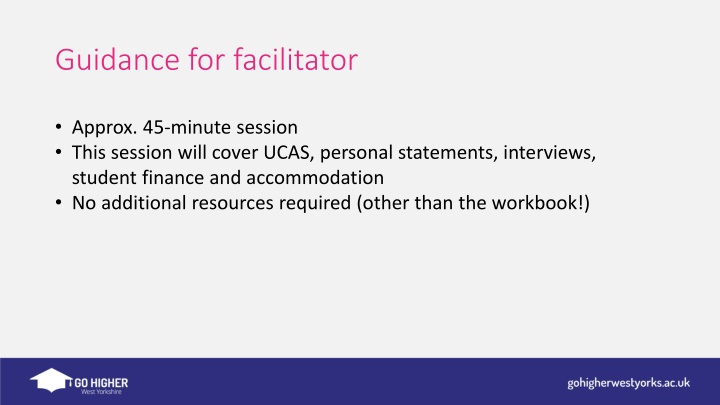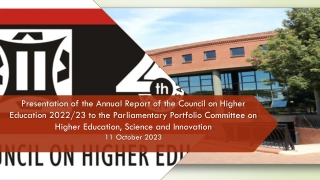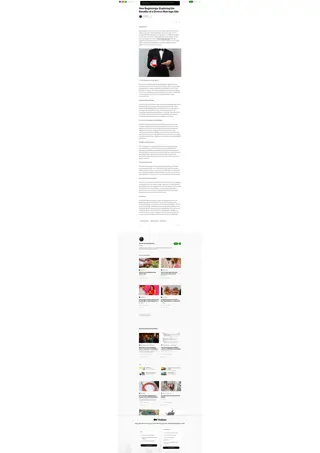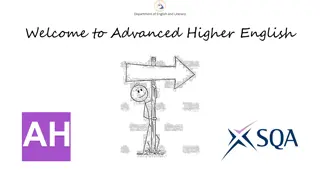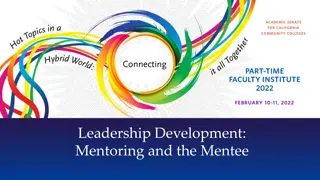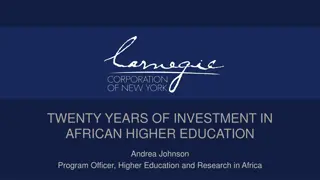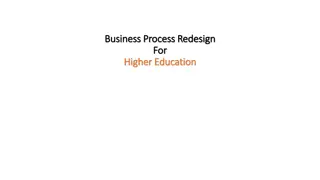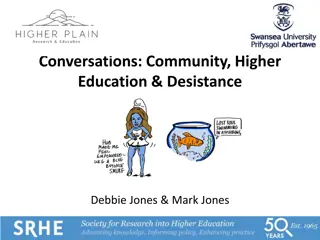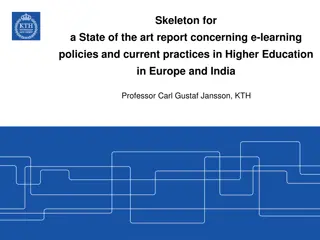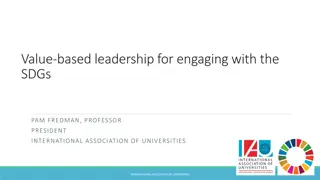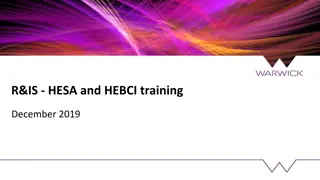Navigating Higher Education Process
Covering UCAS, personal statements, interviews, student finance, and accommodation in a 45-minute session. Learn about applying through UCAS, crafting personal statements, and more essential steps. Dive into the intricacies of university applications and the key components required for a successful higher education journey.
Download Presentation

Please find below an Image/Link to download the presentation.
The content on the website is provided AS IS for your information and personal use only. It may not be sold, licensed, or shared on other websites without obtaining consent from the author.If you encounter any issues during the download, it is possible that the publisher has removed the file from their server.
You are allowed to download the files provided on this website for personal or commercial use, subject to the condition that they are used lawfully. All files are the property of their respective owners.
The content on the website is provided AS IS for your information and personal use only. It may not be sold, licensed, or shared on other websites without obtaining consent from the author.
E N D
Presentation Transcript
Guidance for facilitator Approx. 45-minute session This session will cover UCAS, personal statements, interviews, student finance and accommodation No additional resources required (other than the workbook!)
An introduction to Higher Education: Part 2
HE sounds great! So what now? Last time we talked about routes into HE, choosing a course and choosing a university. But what happens next? Submit an application Applications are submitted in Year 13/Year 2 of your FE studies Applications for university/college degrees are submitted through UCAS Applications for degree apprenticeships are managed differently we ll discuss this in a later session!
UCAS stands for Universities and Colleges Admissions Service Allows you to create one application which is then sent to all of your college/university choices You can choose up to 5 universities and courses. These can be different courses at different universities, the same course at different universities or different courses at one university. The application asks about things like your personal details and grades, as well as asking you to write a personal statement.
Personal statements This is the most important part of your UCAS application It s your chance to tell universities and colleges why you re so fantastic! You may also have to write personal statements for your FE courses and for job applications later on in life. What do you need to talk about? Why you re applying for the course, job or opportunity Career aspirations Skills and abilities What you re good at Other interests Work experience (if you have any)
Turn to page 75 in your workbook Use the prompts provided to think about why you might want to apply to HE, and the skills and experience you already have. You might find inspiration in things you ve done at school, at home, work experience/job or in your social life! Can you remember some of the things you thought of in session one?
What happens after youve applied? Universities will look at all the applications they receive and begin to make offers. Different types of offers: Conditional This is when you are made an offer based on you achieving specific entry requirements, e.g. grades. Unconditional This type of offer guarantees you a place on the course based on the qualifications or experience you already have. Once you have received your offers and chosen your course and university, you enroll onto your course in late September.
UCAS Extra and Clearing For students who don t have an offer of place at the end of their application process, there are two functions designed to help get a place on a course: UCAS Extra This allows you to apply for additional courses once you ve used up all of your places. This is for students who have either not been offered a place or have declined all of their offers. Clearing This is how universities and colleges fill remaining places on their courses. You can apply for a course through clearing if you re not already holding an offer from a university or college, and the course still has places. Clearing usually takes place from Results Day onwards.
Interviews Interviews are when you have a face-to-face (in-person or virtually) meeting to talk about why you would be a good fit for the opportunity on offer. You may have done a bit of work around interviews already in the Intro to FE section. You could have an interview for: Once you ve submitted your application, some HE courses will ask you to attend an interview or audition before they offer you a place. A place at college A place at university A job Other paid and recreational opportunities e.g. volunteering
Quick activity Turn to the person next to you and tell them one of your biggest strengths as a person. Then swap over. You have two minutes
Turn to page 78 in your workbook Have a go at this activity to practice talking about yourself. These are some of the most common questions asked during interviews.
Preparing for interviews You re likely to hear about interview for courses or jobs via email or through the post. You might be asked to prepare a presentation on a relevant topic or a portfolio showcasing your work. How to prepare: Read the instructions you have received carefully Check whether you need to prepare any materials or presentations for your interview Practice interview questions Make sure you have all of the contact and location details that you need for the day Interviewing online? Make sure you know which platform you re using and do a trial run Interviewing in person? Familiarise yourself with the location and how you re getting there.
Types of interview There are a few different types of interview: One-to-one: Where it s just you and the interviewer in the room Panel: Where you re interviewed by more than one person Group: Where you re interviewed alongside other people applying for the same opportunity. This might involve you takin part in an activity with other applicants to showcase your skills.
Auditions and portfolios If you re applying to a specialist institution, you might be asked to attend an audition or produce a portfolio. Auditions: An opportunity to showcase your talents! Prepare a short piece that is relevant to your course and perform it for members of staff from the course. Portfolios: A collection of your best work, designed to show admissions tutors your style and skill. These are often required for creative courses.
Student Finance What word just one word comes into your head when you hear student finance ? Let s talk about it Be ready to feed back with your answers! For the most up-to-date information a good starting point is the government's student finance website: https://www.gov.uk/student-finance
Student Finance Student finance is a big topic that you ll hear loads more about in the coming years. For now, we ll just have a look at a brief overview. What is student finance? Student finance is the money that students can borrow from the government to help them pay for their course, accommodation and general living costs whilst studying.
Student Finance - loans There are two key parts of a student finance loan: Tuition fee loan: This is paid to the university or college to cover the cost of the course. As of September 26th 2022, universities can charge up to 9,250 per years for their courses. The tuition fee loan is paid directly to the university or college by the government. Maintenance loan: This loan is paid directly to you, the student, once per term to help cover living costs such as accommodation, bills, food and travel.
Student Finance additional support There are also grants, bursaries and scholarships available across the UK. The might be available to students with additional support needs, those who achieve highly in particular subjects or who are from low income backgrounds. Students with extra support needs may be eligible for Disabled Students Allowance (DSA). This can help to pay for specialist equipment and other expenses.
Student Finance repayments The idea of repaying a loan can seem scary and overwhelming! However, there are lots of things in place to make sure that people can afford to repay their loans in a safe and worry-free way. Some key facts to remember about student loan repayments are: You won t start repaying your loan until the April after you graduate You will not make any repayments until you are earning over 27,295 If you are earning this minimum figure, repayments generally cost less than a cup of coffee per week If you ever drop below this salary amount, your repayments stop.
Tuition fees Question 1 What is the maximum tuition fee a university or college can charge per year? 15,350 5,500 9,250 7,750 12,800 20,150
Tuition fees Question 2 How much tuition fee do you pay straight away? 100% 50% 0% 15% 10% 30% 80%
How to find out how much you can apply for How to find out how much you can apply for Use the Student Finance England calculator to see the size of loan you can apply for: https://www.gov.uk/student- finance-calculator
Top tips Top tips Open a student bank account Part-time work Plan and budget! If in full-time study Take some money with you. You normally get your Maintenance Loan 3 5 days after you enroll. Make the most of student discounts Different banks have different offers, e.g. free 16 25 railcard. Many also give you an interest free overdraft. It is advised that students work a maximum of 10 12 hours per week. Maintenance Loans are paid in three instalments during the year. The National Union of Students (NUS) / TOTUM card gives you discounts in many shops, restaurants, and cinemas. There are often reductions in travel costs for young people. Apprentice salaries may be paid monthly. So you need to budget to make it last!
Accommodation Choosing where to live whilst you study is a big decision! Your accommodation will be your home away from home. One of the first decisions students need to make about accommodation is whether to live at home or move into student accommodation. This is a personal choice for each student, and there s no right or wrong answer! Have a chat with the person next to you about where you might choose to live at university or college. Make some notes in the space provided on p. 82.
Home vs away Why live at home? Why live away from home? Meet new people Your chosen institution is close to home Gain independence Excitement of living somewhere new Learn new life skills (e.g. cooking, paying bills, etc.) Home comforts Existing support nextworks (e.g. friends and family) Saving money Existing responsibilities (e.g. a job, caring responsibilities)
Wellbeing check Wellbeing check- -in in Page 85-86 Take a few moments to check in with yourself about how you're feeling today. You don't need to share this with anyone else!
